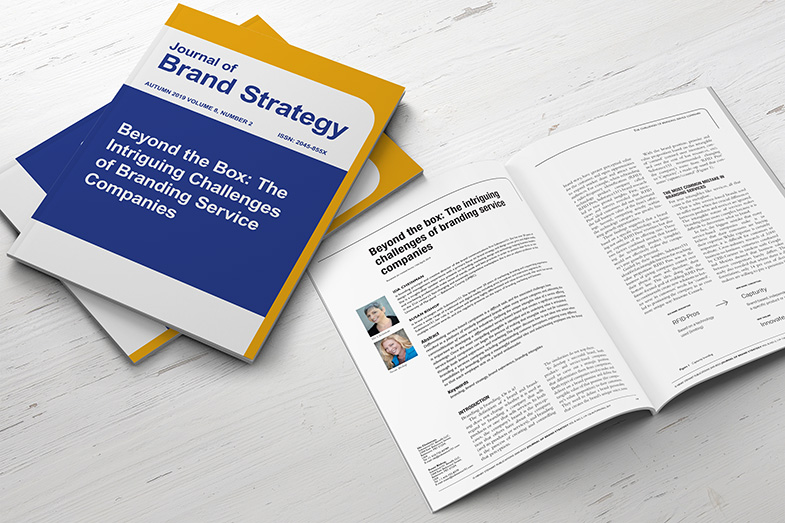
This article was authored for the Journal of Brand Strategy, Henry Stewart Publications, London, UK. JBS is the world’s leading professional and research journal publishing in-depth, peer-reviewed articles and case studies on all aspects of brands.
Differentiating service-based companies is a difficult task, and the associated challenges have resulted in a plethora of similarly positioned brands within many service categories and, ultimately, the commoditization of entire service industries.
Defining the unique intangible value of a service offering is key to developing a differentiated service-based brand that creates a significant competitive advantage. Once the most compelling intangible is identified and its underlying value is articulated, service-based companies can begin the process of making that intangible value real for customers through both brand experience and marketing.
The article highlights the key differences between branding products and services, identifies the rules of successfully branding the intangibles and, using actionable steps and real-life examples, shows how to put these ideas into action:
Branding is branding. Or is it?
The definition of a brand and branding does not change whether it’s used in regard to branding a company that sells products or one that sells services.
But despite the shared definition and foundational brand elements of any well-branded company, product- and service-based brands are not the same.
In fact, products and services are so different that effectively branding the two types of companies requires two distinct thought processes and approaches.
The Most Common Mistake in Branding Services
Physical offerings have unique advantages when it comes to branding. For intangibles like services, all that exists is the metaphor.
The intangible nature of services makes branding them more complex because it is difficult to determine what to brand.
B2B and professional services marketers need to ensure they understand what their customers are actually buying rather than assume that it has something to do with the service being offered, and they need to think about what represents the brand in their customers’ eyes in order to ensure that that representation is, in fact, branded.
Also Read: What Does It Take to Differentiate a Professional Services Brand?
The Key Questions for Differentiating a Service Company
It’s common for professional services to focus only on establishing a “good” relationship with customers and building “trust.” And so brands based on concepts such as “your trusted partner” abound, resulting in a plethora of poorly branded, indistinguishable service companies.
The problem is that if “trust” and “relationship” are the only factors that differentiate a company, it will be left to a customer’s subjective judgment of likeability.
To differentiate a brand within the sea of look-alike competitors, a services company needs to ask:
- A relationship based on what?
- Trust based on what?
In other words, an effective brand — a brand that is differentiated and increases a company’s value — has to be formed from a larger and stronger idea than simply a good relationship. This requires defining the exact nature of the relationship and the exact nature of the trust that is being built.
Identifying the Most Powerful Intangible
Branding intangibles requires looking more deeply at what makes a company special. It also requires understanding that this ‘‘special’ might be very similar to what makes competitors special. In this case, the goal is to find a wholly unique take on that similarity.
And this requires an in-depth brand and customer research process that brings a higher level of curiosity and openness.
Making the Intangible Tangible
Once a service company’s brand (purpose, position, promise, value proposition, values and personality) are defined, they must be made real. No matter how intangible these elements may seem, they must be made concrete through everything the company says and does and how it lives its brand.
Service-based companies must identify their true differentiator and build a brand that inspires marketing opportunities for creating a tangible proof at every touchpoint. In fact, the ability to generate endless ideas for brand execution is a sign of a strong, truly differentiated brand.
Until there is a core idea that sparks that kind of thinking, the best thing to do is continue to think.
From Abstract to Action
Putting thinking and approaches unique to branding service companies into action requires embracing the fact that the road ahead is, indeed, complex. Here is what services companies and the teams tasked with branding them need to remember:
- Understand customer perceptions and what customers are really buying.
- Be ready to peel back the layers around the relationship and explore many possibilities for branding.
- Find the most powerful intangible and don’t stop until a meaningful core idea emerges, an idea that has “legs” and will differentiate and endure.
- Design customer journeys that actualize the core idea, building trust and deepening the relationship at each step.
- Make the intangible even more tangible by creating opportunities to do so at every customer touchpoint.
- Indoctrinate employees in the brand so that each person representing the company embodies the core idea and acts as a brand ambassador, delivering on the brand promise every time.